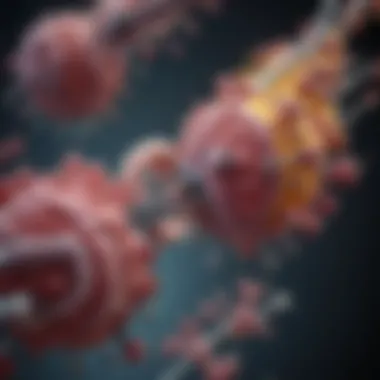Exploring EGFR Treatment Strategies in Colorectal Cancer


Intro
The epidermal growth factor receptor (EGFR) is a critical component in cell signaling pathways related to growth and differentiation. Understanding its role in colorectal cancer treatment is essential for enhancing therapeutic strategies. Colorectal cancer, a leading cause of cancer-related deaths globally, has seen evolving treatment modalities, notably incorporating targeted therapies. This article explores the nuances of EGFR treatment in this context, providing insights that aim to benefit students, researchers, and professionals alike.
Research Highlights
Overview of Key Findings
Research indicates that EGFR inhibitors, such as Cetuximab and Panitumumab, demonstrate significant efficacy in treating metastatic colorectal cancer. These monoclonal antibodies function by binding to the EGFR, blocking its activation and subsequent signaling pathways that promote tumor growth. Clinical trials have established that combining these therapies with chemotherapy can lead to improved progression-free survival rates.
"EGFR inhibitors have changed the paradigm of treating specific subtypes of colorectal cancer, offering options where traditional chemotherapy may fail."
Significance of the Research
The importance of studying EGFR treatment lies in the therapy's potential to personalize patient care. Understanding which patients are most likely to benefit from these treatments is crucial. There is a need to identify biomarkers, such as KRAS, NRAS, and BRAF mutations, as these can influence a patient’s response to EGFR inhibitors. This focus not only enhances the effectiveness of treatments but also minimizes unnecessary side effects for those unlikely to respond.
Original Research Articles
Summary of the Article
Numerous articles have explored the mechanisms behind EGFR signaling and its impact on colorectal cancer. These studies examine various treatment regimens that incorporate EGFR inhibitors, analyzing their effects on tumor growth and patient survival. The collated research offers a nuanced understanding of how EGFR modulation can lead to better clinical outcomes.
Author Contributions
The authors of these original research articles typically consist of oncologists, molecular biologists, and researchers specializing in targeted therapies. They often bring together comprehensive data from clinical trials and laboratory studies, reflecting a multidisciplinary approach crucial for advancing the understanding of EGFR in colorectal cancer treatment.
In summary, as the landscape of cancer treatment continues to evolve, the understanding of EGFR's role will remain pivotal. Continuous research in this area promises advances in therapy and improved patient outcomes.
Preface
The treatment of colorectal cancer has evolved significantly over the past few decades. This progress is largely due to the recognition of the epidermal growth factor receptor (EGFR) as a critical target in therapy. Understanding the role of EGFR in colorectal cancer not only aids in patient management but also contributes to the broader landscape of oncological research. This section serves as a foundation for comprehending how EGFR-targeted therapies function and their relevance in modern oncology.
The importance of targeted therapy, particularly concerning EGFR, cannot be overstated. Targeted therapies, unlike traditional chemotherapies, focus on specific molecular targets associated with cancer. This approach often results in enhanced efficacy and reduced side effects. Given the growing understanding of the molecular underpinnings of colorectal cancer, the integration of targeted therapies has become essential in developing treatment plans tailored to individual patients.
Moreover, the advancements in molecular diagnostics allow for better patient selection in targeted therapies. Understanding the characteristics of EGFR will enhance insights into how these therapies can be optimized. In this article, we discuss the mechanisms of EGFR, its inhibitors, and the challenges that arise in treatment. Ultimately, the goal is to provide a clear, informative guide on the implications and future prospects of EGFR treatment in colorectal cancer.
"The future of oncology lies in targeted therapies and personalized medicine, which are vital in transforming cancer treatment approaches."
Overview of Colorectal Cancer
Colorectal cancer is a complex disease characterized by the uncontrolled growth of cells in the colon or rectum. It often develops from precancerous polyps, which can evolve into malignant tumors over time. It is known to be one of the most common cancers worldwide, signifying the need for effective management strategies. Various risk factors contribute to its progression, including age, genetic predisposition, dietary choices, and lifestyle factors.
Early detection plays a critical role in improving survival rates. Screening methods such as colonoscopy allow for the identification and removal of polyps before they can develop into cancer. Treatment options vary based on the stage of the disease and may include surgery, chemotherapy, and targeted therapies like those directed at EGFR. Understanding the biology of colorectal cancer is essential for facilitating appropriate treatment decisions.
Importance of Targeted Therapy
Targeted therapy represents a significant shift in cancer treatment paradigms. These therapies aim to block the growth and spread of cancerous cells by interfering with specific proteins required for tumor growth. In colorectal cancer, EGFR is an attractive target due to its role in cell signaling pathways that regulate proliferation and survival.
The benefits of targeted therapy are multifaceted:
- Precision: It allows for more effective treatment by focusing on the unique characteristics of a patient's cancer.
- Reduced Toxicity: Compared to traditional chemotherapy, targeted therapies often exhibit fewer side effects, improving quality of life during treatment.
- Enhanced Outcomes: Many studies indicate that incorporating targeted therapies can improve overall survival rates and quality of response, particularly in patients with specific mutations or expressions of biomarkers.
EGFR: Biological Role
The epidermal growth factor receptor (EGFR) is essential in the biological processes that underlie colorectal cancer progression. This section elucidates the significance of EGFR's role in cancer, focusing on its functionalities and implications for targeted therapies. The understanding of EGFR's biological role acts as a pivotal framework for appreciating how specific inhibitors can alter disease outcomes.
What is EGFR?


EGFR, a transmembrane protein, belongs to the ErbB family of receptors. It plays a critical role in regulating cell growth, survival, and proliferation. When bound with its ligands, such as epidermal growth factor, EGFR undergoes a conformational change, initiating a cascade of intracellular signaling pathways.
This receptor is frequently overexpressed or mutated in colorectal cancer, contributing to the malignant characteristics of tumor cells. Studies have shown that such aberrations correlate with poor patient prognosis. Hence, the exploration of EGFR presents a valuable target for therapy, particularly with the advent of monoclonal antibodies that can block EGFR signaling.
EGFR Signal Transduction Pathway
The signal transduction pathway activated by EGFR is crucial for understanding how it influences cancer development. Upon ligand binding, EGFR dimerizes, leading to autophosphorylation of its tyrosine residues. This event stimulates several downstream signaling pathways, including:
- PI3K/Akt pathway: Promotes cell survival and resistance to apoptosis.
- RAS/RAF/MEK/ERK pathway: Supports cell proliferation and differentiation.
- JAK/STAT pathway: Involved in the regulation of gene expression and immune response.
Through these pathways, EGFR signaling can enhance tumor cell growth and invasion. Therapeutic strategies aimed at blocking these pathways can lead to reduced tumor growth and improved patient outcomes. The combination of understanding EGFR's biological mechanisms and its role in signal transduction allows for more effective targeted therapies in colorectal cancer.
"Inhibition of EGFR signaling has revolutionized treatment strategies for colorectal cancer, leading to significant advancements in patient care."
In summary, a clear grasp of EGFR’s biological function and its role in the signaling pathways highlights its importance as a target in colorectal cancer therapies. Research continues to develop more effective inhibitors, which will further elucidate the complexities of this receptor's interactions in tumor biology.
EGFR Inhibitors in Colorectal Cancer
EGFR inhibitors play a crucial role in addressing colorectal cancer. Their targeted approach offers significant benefits in treatment. They impede the signaling pathways that lead to tumor growth. Understanding these inhibitors helps in optimizing therapy for patients. This section explores the types of EGFR inhibitors and their clinical applications, shedding light on their significance in current oncological practices.
Types of EGFR Inhibitors
Monoclonal Antibodies
Monoclonal antibodies are a prominent class of EGFR inhibitors. They work by binding specifically to the EGFR on cancer cells. This binding prevents activation of the receptor, which might otherwise promote cancer cell growth. A key characteristic is their ability to initiate immune responses against tumor cells.
These antibodies, like Cetuximab, have been widely studied. Their effectiveness is evident in treating specific populations of colorectal cancer patients. However, it is essential to recognize their limitations. Resistance may develop, reducing their effectiveness over time. Additionally, the cost of treatment may pose a challenge for some patients, impacting accessibility.
Tyrosine Kinase Inhibitors
Tyrosine kinase inhibitors represent another category of EGFR inhibitors. Unlike monoclonal antibodies, they work by blocking the intracellular signaling pathways directly. A significant feature of these drugs, such as Erlotinib, is their oral administration. This offers convenient options for patients compared to intravenous therapies.
These inhibitors can be particularly effective in specific genetic contexts. For patients with certain mutations, tyrosine kinase inhibitors may be more beneficial than traditional therapies. Yet, they also have downsides. Patients may experience various side effects, including gastrointestinal issues and skin toxicity. Understanding these aspects is essential in optimizing treatment plans.
Clinical Applications
The clinical applications of EGFR inhibitors are immense. They are most effective in cases of advanced colorectal cancer. Their use is often combined with other treatments to improve outcomes.
Information on patient selection is vital. This ensures that those most likely to benefit from EGFR inhibitors are identified. Patients with wild-type KRAS genes generally respond well to these therapies. Age, performance status, and comorbidities also play a role in treatment decisions.
Incorporating EGFR inhibitors in clinical practice demonstrates a shift to more personalized medicine. It allows for tailored approaches that take into account the individual characteristics of both the disease and the patient.
Efficacy of EGFR Treatments
Efficacy of EGFR treatments is critical for understanding how they influence patient outcomes in colorectal cancer. This section covers how effective these therapies can be, the factors affecting these response rates, and the importance of patient selection. Overall, the efficacy of these treatments leads to improved survival rates and quality of life for many patients.
Response Rates
Response rates for EGFR treatments can vary significantly based on patient characteristics and the type of cancer. In many clinical trials, cetuximab and panitumumab have shown promising response rates among patients with wild-type KRAS.
Research indicates that nearly 20-25% of patients with metastatic colorectal cancer exhibit substantial tumor shrinkage when treated with EGFR inhibitors like cetuximab. However, it's essential to recognize that these rates may differ among demographics, disease stages, and treatment backgrounds.
Recent studies reflect that efficacy is higher in patients whose tumors express specific biomarkers, such as EGFR itself. Moreover, patients with previously untreated disease often show better responses compared to those who have undergone multiple therapies.
Patient Selection Criteria
Choosing the right patients for EGFR treatment is vital for maximizing treatment efficacy. Several key factors play a role in this selection process:
- Genetic Profiling: Understanding the genetic makeup of a patient's tumor is critical. KRAS mutations typically result in resistance to EGFR inhibitors. Thus, patients with wild-type KRAS are more likely to benefit from treatment.
- Tumor Burden: The extent of disease spread can also influence treatment outcomes. Patients with limited metastatic burden often experience better responses.
- Previous Therapies: Patients who are treatment-naive will usually respond more favorably. Those who have been previously treated with other chemotherapy may exhibit resistance.
- Performance Status: The patient’s health and ability to carry out daily activities can determine how well they tolerate specific therapies.


In summary, while EGFR treatments offer a targeted approach for colorectal cancer, their efficacy depends heavily on genetic factors and patient selection. Understanding these aspects ensures better patient outcomes.
Resistance Mechanisms
Resistance mechanisms are crucial in the context of EGFR treatment in colorectal cancer. Understanding these mechanisms helps in tailoring therapies better and extending the life of treatments designed to inhibit the EGFR pathway. This topic examines both primary and acquired resistance to EGFR inhibitors, shedding light on challenges faced in clinical practice and research. The insights gained here can enable healthcare professionals to refine treatment plans and possibly improve overall patient outcomes.
Primary Resistance
Primary resistance refers to the inherent lack of response to EGFR inhibitors in a subset of patients from the beginning of treatment. Various factors contribute to this phenomenon. Genetic alterations in the cancer cells, such as mutations in the KRAS gene, often play a pivotal role. KRAS mutations typically lead to the continuous activation of the signaling pathway downstream of EGFR, rendering the inhibitors ineffective.
Additionally, overexpression of other growth factor receptors, like HER2, can compete with EGFR, further complicating therapeutic effectiveness. Some tumors may also harbor abnormalities in downstream effectors of the EGFR pathway, affecting the expected response.
Moreover, tumor microenvironment factors can create a hostile setting that diminishes the efficacy of EGFR inhibitors right from the start. For instance, high levels of certain cytokines can contribute to this resistance.
"Understanding primary resistance is essential for identifying patients who may benefit from alternative treatment strategies or combination therapies."
Acquired Resistance
Acquired resistance develops over time in patients who initially respond well to EGFR inhibitors but later experience treatment failure. This form of resistance is often due to the evolutionary dynamics of cancer cells. Modifications in the tumor cells lead to the activation of alternative signaling pathways, allowing them to bypass the inhibited EGFR pathway.
Key alterations associated with acquired resistance include mutations in the EGFR gene itself, particularly the T790M mutation, which can reduce the binding affinity of inhibitors. Other mechanisms include amplifications of signaling components, such as MET, which can activate compensatory pathways independent of EGFR.
Recent studies highlight the importance of continuous monitoring for mutations and pathway alterations in patients undergoing treatment. This proactive approach may offer ways to adjust therapies as resistance mechanisms evolve.
Understanding and addressing both primary and acquired resistance mechanisms can enhance the efficacy of EGFR-targeted treatments in colorectal cancer. As research continues, new insights will likely contribute to more effective management strategies, improving patient outcomes in this challenging field.
Combination Therapies
Combination therapies in the context of EGFR treatment for colorectal cancer hold substantial importance. These strategies aim to enhance the overall effectiveness of treatment regimens by integrating various therapeutic agents. The rationale behind combination therapies lies in their potential to address both tumor growth and resistance mechanisms that a single therapy may not effectively overcome. By synergizing different drug classes, clinicians seek to improve response rates, prolong survival, and enhance the quality of life for patients.
EGFR Inhibitors with Chemotherapy
The effectiveness of EGFR inhibitors significantly increases when used in conjunction with chemotherapy agents. This approach allows clinicians to strike at multiple facets of tumor biology.
Chemotherapy drugs induce cytotoxic effects that can destabilize cancer cells. When combined with EGFR inhibitors such as cetuximab or panitumumab, there is a dual mechanism at work. While chemotherapy directly kills cancer cells, EGFR inhibitors block pathways that promote cell proliferation and survival.
Research indicates that using these two modalities together can lead to:
- Improved overall survival rates.
- Enhanced progression-free survival periods.
- A distinct increase in the tumor response rate.
However, there are considerations to be mindful of. The potential for increased toxicity and side effects can complicate treatment outcomes. Thus, careful patient monitoring and dosage adjustments may be necessary.
Targeting Multiple Pathways
The complexity of cancer biology often necessitates a multifaceted approach. Targeting multiple pathways is a strategic element of combination therapies, particularly in colorectal cancer wherein EGFR plays a significant role alongside other pathways such as VEGF and KRAS.
By utilizing therapies that simultaneously inhibit various signaling pathways, one can diminish the likelihood of resistance development. For example, in some cases, it has been shown that when EGFR inhibitors are paired with agents targeting VEGF, there is a substantial enhancement in therapeutic efficacy. This dual targeting strategy serves to disrupt cancer cell survival signals on two fronts, potentially leading to a more robust tumor response.
Emerging Research
Research in the field of EGFR treatment for colorectal cancer is evolving rapidly. This section emphasizes new developments that hold great promise for improving patient outcomes. The continuous exploration of EGFR inhibitors and personalized medicine illustrates the possibilities for more effective and tailored treatments, fostering a more nuanced approach to therapy. Understanding emerging research is vital, as it can directly influence clinical practice and patient care.
Novel EGFR Inhibitors
Recent advancements have led to the creation of novel EGFR inhibitors that are demonstrating potential in overcoming some of the limitations associated with traditional treatments. These new agents aim to enhance specificity and reduce side effects.
Key points include:


- SAR244236: A next-generation EGFR inhibitor that has shown efficacy in preclinical studies.
- EGFR-Antibody drug conjugates: These link drugs directly to antibodies that target EGFR, minimizing damage to healthy cells.
- Resistance-modulating agents: Research is focused on inhibitors that can counteract resistance mechanisms, thus broadening the patient population that could benefit from EGFR targeting.
Emerging therapies are evaluated through clinical trials, offering insights into their effectiveness and safety. The responsibility lies in determining how these innovations can be practically integrated into existing treatment regimens.
Personalized Medicine Approaches
Personalized medicine represents a paradigm shift in the treatment of colorectal cancer. It involves tailoring treatments based on individual patient characteristics, particularly genetic profiles. In the context of EGFR treatment, this means selecting therapies that target specific mutations within the EGFR gene or its associated pathways.
Benefits of personalized medicine in EGFR treatment include:
- Improved Efficacy: Personalized treatments can lead to better responses based on the unique genetic makeup of each patient.
- Reduced Toxicity: By focusing on specific patient profiles, the likelihood of adverse effects can be decreased.
- Data Utilization: Advances in genomic testing allow oncologists to utilize data effectively, ensuring patients receive the most suitable treatment.
Emerging research in this area emphasizes the significance of biomarker identification. Biomarkers such as KRAS mutations are crucial in determining eligibility for certain EGFR inhibitors.
"Personalized medicine focuses on the unique nature of each patient’s cancer, providing a more refined treatment strategy that aligns with clinical findings."
Future Directions
The future of epidermal growth factor receptor (EGFR) treatment in colorectal cancer holds significant promise. Research continues to evolve, leading to new understandings and innovative therapies. As we look ahead, the importance of clinical trials and the potential of biomarkers take center stage. Both areas are crucial for developing effective treatment strategies that cater to individual patient needs.
Clinical advancements depend on rigorous testing of new drugs and combinations in diverse patient populations. Trials provide insights into efficacy and safety, which are essential for integrating EGFR inhibitors into broader treatment plans. Not only do they assess response rates, but they also help identify which patients are likely to benefit the most from specific therapies.
Additionally, the identification and validation of biomarkers represent a transformative leap in treatment personalization. Biomarkers can indicate how well certain therapies will work, allowing clinicians to tailor treatments more precisely. Such developments not only enhance patient outcomes, but also reduce unnecessary side effects from ineffective treatments. The interplay between clinical trials and biomarkers emphasizes a future that is increasingly patient-centered, aiming for precision in oncology.
"Advancements in EGFR treatment underscore the need for targeted therapies that resonate with the unique genetic profile of each patient's cancer."
As these elements gain prominence, it becomes clear that the future of EGFR treatment requires a multifaceted approach. Collaboration among researchers, oncologists, and patients is vital to foster an environment where innovative trials and biomarker research can thrive.
Clinical Trials and Studies
To fully grasp the potential of EGFR treatments, one must understand the landscape of ongoing clinical trials. These studies are designed to explore various aspects of treatment, assessing both new medications and combinations with existing therapies.
Most trials focus on multiple objectives:
- Efficacy: Determining how well a treatment works in real-world scenarios.
- Safety: Assessing adverse effects and overall patient health compared to standard treatments.
- Patient Responsiveness: Investigating which patient characteristics can predict a positive response to treatment.
These trials vary greatly in their designs. Some prioritize large cohort studies to assess diverse populations, while others may examine smaller, more controlled groups. The results help inform clinical practice, guiding oncologists on the best course of action for individual patients.
Potential of Biomarkers
Biomarkers are invaluable in the context of EGFR treatment. They serve as indicators of how a patient may respond to specific therapies. For example, the identification of KRAS mutations can significantly influence treatment decisions, as patients with these mutations often do not benefit from EGFR inhibitors such as cetuximab or panitumumab.
Key advantages of utilizing biomarkers include:
- Personalized Medicine: Ensuring that patients receive treatments tailored to their genetic makeup.
- Improved Outcomes: Increasing the likelihood of positive responses through informed treatment selection.
- Cost-Efficiency: Minimizing the economic burden on patients by avoiding ineffective treatments.
In summary, the prospect of integrating clinical trials and biomarkers into EGFR treatment reflects a shift toward more accurate and effective cancer care strategies. The ongoing exploration of these dimensions will undoubtedly influence the future of colorectal cancer treatment, driving progress toward personalized healthcare.
Culmination
The topic of conclusion holds significant importance in this article as it encapsulates the findings and insights presented throughout. A well-structured conclusion not only serves to reinforce the main ideas but also provides a coherent understanding of the role of EGFR treatment in colorectal cancer. It invites readers to reflect on the implications of the research and its practical applications.
Summary of Key Findings
The key findings of this article reveal the multifaceted impact of EGFR treatment in colorectal cancer management. Notably, the findings include:
- Understanding EGFR Mechanism: The biological role of EGFR is crucial in cellular processes, influencing tumor growth and treatment response.
- Efficacy of Inhibitors: EGFR inhibitors demonstrate varying response rates among patients. Understanding the effectiveness of these therapies enhances their clinical utilization.
- Resistance Mechanisms: Identifying both primary and acquired resistance to treatments informs better patient management strategies.
- Combination Therapies: Integrating EGFR inhibitors with other therapies shows promise in overcoming resistance and improving outcomes.
- Future Insights: Emerging research and novel EGFR inhibitors offer a pathway for personalized and effective treatments based on biomarker profiles.
Implications for Future Research
The implications for future research in the realm of EGFR treatment are profound. Continued studies should focus on:
- Novel Therapeutics: Exploration of new EGFR inhibitors and their mechanisms could lead to enhanced treatment options.
- Biomarker Development: Identifying predictive and prognostic biomarkers will facilitate personalized medicine approaches, optimizing treatment for individual patients.
- Longitudinal Studies: Investigating the long-term effects of EGFR inhibition in diverse populations can reveal critical insights into efficacy and safety.
- Resistance Mechanism Research: A deeper understanding of resistance mechanisms will inform therapeutic choices and improve patient outcomes.
Promoting interdisciplinary research to bridge laboratory findings with clinical applications will advance the field significantly. Enhancing the understanding of EGFR dynamics could revolutionize the treatment landscape for colorectal cancer patients.







